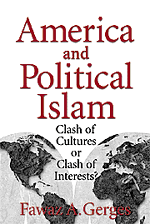Book contents
- Frontmatter
- Contents
- Acknowledgments
- 1 Framing American Foreign Policy
- 2 The Intellectual Context of American Foreign Policy
- 3 Islam and Muslims in the Mind of America
- 4 The Carter, Reagan, and Bush Administrations' Approach to Islamists
- 5 The Clinton Administration: Co-opting Political Islam
- 6 The Islamic Republic of Iran
- 7 Algeria
- 8 Egypt
- 9 Turkey
- 10 Conclusion
- References
- Index
2 - The Intellectual Context of American Foreign Policy
Published online by Cambridge University Press: 05 June 2012
- Frontmatter
- Contents
- Acknowledgments
- 1 Framing American Foreign Policy
- 2 The Intellectual Context of American Foreign Policy
- 3 Islam and Muslims in the Mind of America
- 4 The Carter, Reagan, and Bush Administrations' Approach to Islamists
- 5 The Clinton Administration: Co-opting Political Islam
- 6 The Islamic Republic of Iran
- 7 Algeria
- 8 Egypt
- 9 Turkey
- 10 Conclusion
- References
- Index
Summary
As is often the case, a vital policy debate occurs at the periphery of the policy process, amid an academic and intellectual milieu. Although some opinion makers and academics, owing allegiances to various benefactors and institutions, may be constrained by their positions in the institutional hierarchy, they do not voluntarily forgo the liberty to speak their own minds. There is ample room for divergent views, since academics and commentators are less inhibited than policy makers. Thus, to grasp and appreciate fully the complex dynamics and dialectics informing U.S. policy, one needs to situate it within the following underlying academic and intellectual moorings.
This chapter examines the differing views of opinion makers and academics toward Islamic politics. On no issue is the U.S. intellectual scene more polarized than on political Islam. Most opinion makers subscribe either to the confrontationalist or accommodationist camp. The goal here is to illuminate the assertions of both camps and their conflicting policy recommendations inasmuch as the direct target of both is to influence the making of American foreign policy. The views of confrontationalists and accommodationists are well represented within the American foreign-policy-making elite. By comparing and contrasting the various positions of both camps, one hopes to shed light on the weight of domestic politics in affecting policy formulation and its intellectual foundation.
Two themes set accommodationists and confrontationalists apart. The first concerns optimism versus skepticism regarding the prospects for democracy in Muslim societies as well as Islamists' democratic pretensions.
- Type
- Chapter
- Information
- America and Political IslamClash of Cultures or Clash of Interests?, pp. 20 - 36Publisher: Cambridge University PressPrint publication year: 1999



